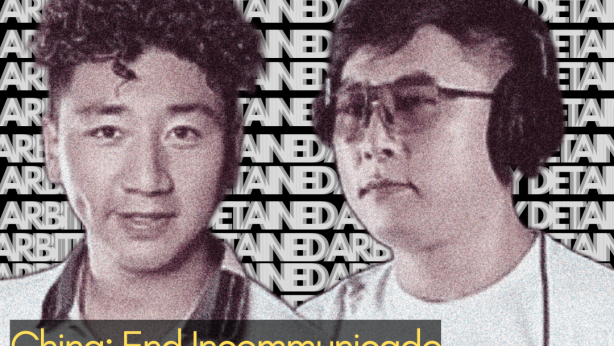China imprisons Tibetan nomad for “illegal contents” he had shared online five years ago
The Tibetan Centre for Human Rights and Democracy (TCHRD) is deeply distressed to learn about the sentencing of a 50 yr-old Tibetan man to one-year prison term for posting on his personal WeChat account contents deemed illegal by Chinese authorities in Machen (Ch: Maqin) County, Golok (Ch: Guoluo) Tibetan Autonomous Prefecture, Qinghai Province, in the Tibetan province of Amdo.
Mr Tashi Gyal, a nomad from Ragya Town in Machen County, was convicted for “inciting separatism” last year on 13 October for perceived crimes committed five years ago. Mr Gyal had been detained on 16 May after he was summoned for interrogation at the local police station. His phone was confiscated. He was then sentenced to 15-day ‘administrative detention’. On 30 May, Mr Gyal’s detention was extended leading to his formal arrest on 12 June.
The so-called evidence used by Chinese prosecutors against Mr Gyal exposes the way the state surveillance and censorship apparatus monitors and spies upon local Tibetans. According to the Chinese Human Rights Defenders, the prosecutors charged Mr Gyal for downloading and forwarding four photos about the Dalai Lama’s lectures to his group chat on 19 May, 12 October, and 14 October in 2014. Again on 1 January 2015, Mr Gyal shared photos of the Tibetan national flag and Lobsang Sangay, exiled head of the Central Tibetan Administration, on his group chat whose members liked and commented on the photos. The same year on 1 March, considered a sensitive month by the Chinese due to the 10 March National Uprising anniversary, he posted a “New Year greeting video speech” that was related to “Tibetan independence”. Then on 2 November, he forwarded to his group chat a message that expressed hope for “the return of the 14th Dalai Lama to Tibet” as well as images and videos of the Dalai Lama and Lobsang Sangay.
Chinese authorities had apparently verified Mr Gyal’s “illegal” contents by sending them to the Quality Inspection Center of TAR Press and Publication Bureau, which determined that the contents were related to “endangering national sovereignty, security and territorial integrity.” This was followed by the Guoluo State Procuratorate sending the case for trial. The Guoluo Intermediate People’s Court held the trial behind closed doors where Mr Gyal argued that the number of people who viewed his online posts was too small to be prosecuted but the court decreed differently.
TCHRD believes that Mr Gyal’s sentencing violates various international human rights treaties signed by China that provides for the right to privacy and other linked human rights. The PRC’s intrusion into the right to privacy is based on an impermissibly broad interpretation of the exceptions to the right to privacy. As is evident, Mr Gyal was imprisoned because he merely exercised his conscience non-violently by posting and sharing among friends contents related to the Tibetan spiritual leader His Holiness the Dalai Lama, Mr Lobsang Sangay and the Tibetan national flag. In particular, Mr Gyal’s right to freedom of opinion is a non-derogable right and no exceptions such as state security can be provided to restrict this right.
Article 17 of the International Covenant on Civil and Political Rights (ICCPR) protects the right to privacy. Even though the PRC signed but not ratified the ICCPR, it is still required by international law to protect the right to privacy because it is part of customary international law, which is binding on all UN member states. The cases of the PRC violating the right to privacy in Tibet are important as examples of the PRC refusing to apply international standards that they purport to support internationally. They are also important because they have a chilling effect on speech in Tibet.
Many of the PRC’s legislation that restricts the right to privacy are so broad that it is impossible to know when the right to privacy may be restricted. Vaguely written Cyber Security Law enforced since June 2017 prohibits individuals from using the Internet to “endanger national security, advocate terrorism or extremism, [or] propagate ethnic hatred and discrimination,” and from “overthrowing the socialist system” and “fabricating or spreading false information to disturb economic order.”
As TCHRD’s recent report showed, violating the right to privacy impacts other rights including freedom of expression, the right to seek, receive and impart information, and the right to freedom of peaceful assembly and association. Some of these violations stemmed from the chilling effect surveillance had on communications.


